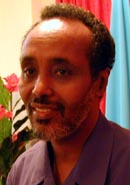Andrew
Maykuth Online
|
 |
President Abdiqasim Salad Hassan |
MOGADISHU,
Somalia - Abdiqasim Salad Hassan received a hero's welcome 18 months ago
when he arrived in Mogadishu, the first leader in a decade who could
legitimately claim to be head of state in this stateless nation.
But
his popularity wilted about as quickly as the flowers that were thrown on
the streets to greet him after his appointment as president of Somalia's
Transitional National Government.
Today,
he can barely venture into public in Mogadishu, so few are the places
where he is respected or safe. His government, if it can be called that,
is bereft of money, respect and authority. It controls only part of this
ruined seaside city, where warlords backed by armed gangs of drug-dazed
men still rule over vast districts.
So
what happened to the euphoria after the peace conference attended by 810
Somalian leaders in Arta, Djibouti, where Abdiqasim emerged as leader?
International
donors stayed away, declining to help Somalia until the new government
proved itself. Abdiqasim complains that foreign donors - mostly the United
States - were frightened away by the failed U.N. intervention in the
1990s, depicted in the movie Black Hawk Down.
Some
say he got off on the wrong foot almost immediately after his appointment
at the Arta shir, or gathering of clans. He sought help from Arab
countries, angering regional power Ethiopia, which fears the growing
influence of fundamentalist Islam in the region.
Saudi
Arabia pledged hundreds of millions of dollars in aid but actually paid
less than $20 million. The transitional government says the money was used
to help create a police force and army from former clan gangs. It is now
so broke that the police went unpaid for four months.
Ethiopia,
miffed at the lack of respect from its neighbor, has funneled assistance
to several factional leaders, providing a greater incentive for them to
oppose Abdiqasim's government than to join it. The Somali Restoration and
Reconciliation Council, based in the town of Baidoa, is the
Ethiopian-backed opposition to Abdiqasim.
"The
international community from east and west has not been forthcoming,"
he said in an interview at his compound in Mogadishu. He recently received
$2 million in aid from Libya, one of the few countries that have opened a
diplomatic mission in Mogadishu.
Abdiqasim's
alleged link to extremist Islamic groups is a major reason why Western
nations have been uneasy about his regime. The Bush administration has
warned that the lawlessness of Somalia makes it a potential hideout for
fugitive terrorists from Osama bin Laden's al-Qaeda organization. As a
result, the administration has threatened to make the country a target in
its campaign against terrorism.
Abdiqasim
denies he was ever a member of Al Itihaad al Islamiya, a Somalian
fundamentalist group that the Bush administration calls a terrorist
organization.
He
said that several documents circulated by warlords that allege he joined
the extremist groups more than a decade ago were fabrications. Ethiopia
and its warlord allies, he said, are playing up the terrorism threats to
curry favor with the Americans.
"The
Somali people have been terrorized by what we see and hear and read in the
Western media," he said.
Authorities
in Somalia say that whatever terrorism activity existed in Somalia has
either gone underground or disappeared altogether since Sept. 11. The
training camps that supposedly sheltered some of the terrorists who
undertook the 1998 bombings of two American embassies in East Africa have
been closed for two years.
Abdiqasim
was the last interior minister under the socialist dictatorship of Mohamed
Siad Barre, who ruled this nation on the Horn of Africa for 21 years until
he was ousted in January 1991. Since then, no central government has
emerged.
Mogadishu
seems to have achieved a sort of normalcy of postapocalyptic bedlam. The
city's main port and air terminal are closed because warlords who have
refused to join the government can fire on them with artillery. Those same
warlords often run their own airstrips or beach ports.
The
foreign ministry's building and its archives - the source of some of the
documents said to implicate Abdiqasim - are under the control of Hussein
Mohamed Aidid. Aidid's father was the warlord whose rule the U.S. military
was attempting to lasso in 1993 when 18 Americans were killed. Now Hussein
Aidid is allied with Ethiopia and portrays himself as America's friend as
well.
The
Transitional National Government - TNG - sought to enlist the support of
various warlords, some of whom were given meaningless cabinet positions in
return for ceasing to fight. Abdiqasim's latest government has 35 cabinet
ministers.
"Every
clan is represented on TNG," said Jabril Ibrahim Abdulle, the
director of programs at the Somalia Center for Research and Dialogue.
"But the problem is that people who were in the city never
reconciled, never talked about reconciliation. Reconciliation is not
something you can buy."
Somalia
seems doomed to instability in perpetuity.
No
country as devastated as Somalia has emerged from anarchy without
substantial international aid. And few countries could claim to be in
worse condition. Lebanon, Sierra Leone and Liberia were never without
central governments and institutions. Afghanistan is receiving billions of
dollars in aid to reestablish a central government.
To
hope Somalia can pull itself out on its own is expecting a lot. "It's
kind of a chicken-and-egg situation," said a Western diplomat who
monitors the region.
Considering
what happened here in 1993, almost no one is eager to return to Mogadishu
except for a few journalists and aid workers, who now must pay $10
admission fees to view the overgrown Black Hawk helicopter wreckages.
Somalia is more comfortably experienced from afar, by American planes and
ships that are now patrolling its borders to monitor suspicious movements.